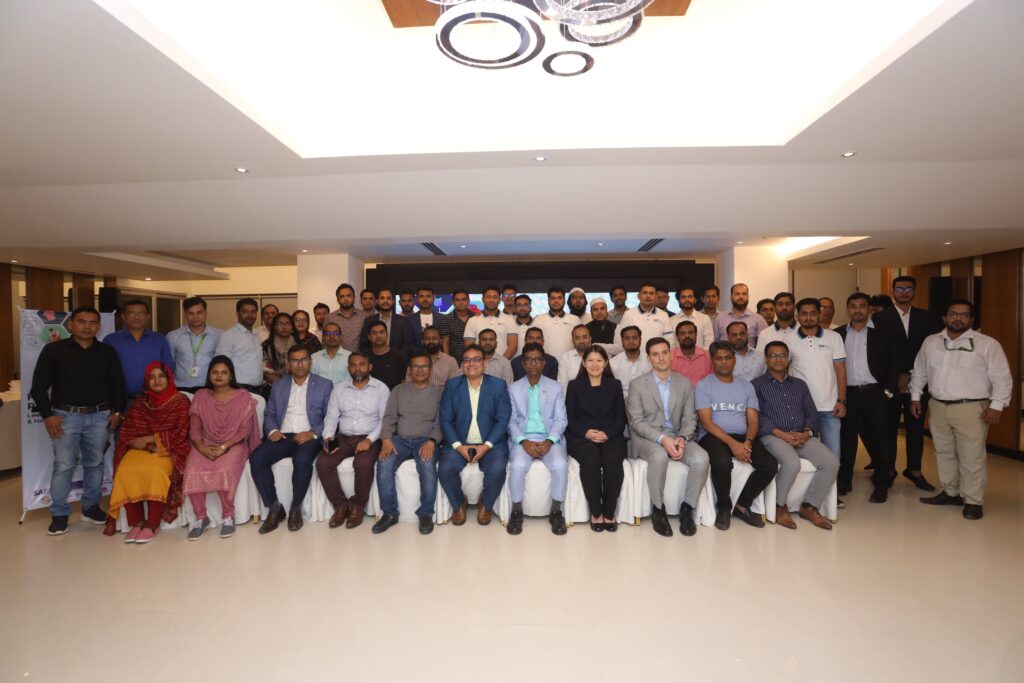The FairCapacity Project’s main objective has been to improve labor compliance, increase transparency, and improve buyer-supplier relations.
Social Accountability International (SAI), together with local partner, GSCS International Ltd., held a closing event for the FairCapacity Project entitled, “FairCapacity Closing: Learnings, Improvements, and Next Steps” and moderated by Abdul Alim, CEO of SMS Bangladesh and Lead Trainer at SAI. This event offered a chance for stakeholders to reflect on their experiences, share any final ideas about the project, and disseminate learnings from the last four years. In addition to SAI, the event featured speakers from GSCS International Ltd., the European Union (EU), Winrock International, Bangladesh Knitwear Manufacturers and Exporters Association (BKMEA), Aznir Apparels Ltd., Zee Fashion Ltd., and more.

The main objective of the FairCapacity Project has been to improve working conditions in the apparel supply chain in Bangladesh through increased transparency and traceability in production planning and sourcing. In an early finding, the FairCapacity Project team identified that many business owners use an informal and inaccurate method of calculating their production capacity, leading manufacturers to take on more orders than they have the capacity to produce. This overestimation of capacity leads to reliance on subcontracting (often unauthorized subcontracting) and scheduling excessive overtime, increasing the risk of forced labor.
To address these issues, the FairCapacity team has undertaken a variety of activities: developing a Production Capacity Calculator and FairCapacity online platform, creating several FairCapacity tools geared towards both buyers and suppliers, delivering dozens of trainings, hosting several events, and providing capacity building and custom assessments, including baseline and end line assessments supporting improvements for over 20 producers. Over the course of the project, SAI engaged 75 buyers and suppliers, helping suppliers gain greater insight into their production and increase labor compliance, assisting buyers in gaining greater visibility into their supply chains, and facilitating greater trust between buyers and suppliers.
Speakers at the event recalled their experiences during the FairCapacity Project. “The best outcome of participating in this program, for me, is that we can now visualize and predict the actual production capacity of our factory. It can be an automatic choice for the other factories in future, said Managing Director of Zee Fashion Ltd., Md. Zohurul Islam. “[SAI] facilitated a series of training and capacity building sessions with no cost. These sessions helped us to know how to improve system and labor performance in our organization and the factors responsible for poor production activities,” remarked Sajjadul Islam, Sr. Executive of HR, Admin and Compliance at Anzir Apparels Ltd. Worker Representative at Anzir Apparels Ltd., Mr. Zahid Mollah, also added, “The way [SAI] facilitated this project was great. We learned how we can perform our duties in a better way as a bridge between workers and owners and how we can put an impact to overall workplace environment. The trainers discussed with us that workers believe us, we are their closest and they also come to us if they have any issues.”
“The way [SAI] facilitated this project was great. We learned how we can perform our duties in a better way as a bridge between workers and owners and how we can put an impact to overall workplace environment. The trainers discussed with us that workers believe us, we are their closest and they also come to us if they have any issues.”
Mr. Zahid Mollah, Worker Representative at Anzir Apparels Ltd.
The event closed with a short award ceremony to honor and thank Project participants, and additional remarks to celebrate the successes of the project and present next steps to bring the learnings and insights of the FairCapacity Project into the future. These include providing free access to project tools through SAI’s website and offering advanced training and technical assistance for suppliers through GSCS, SAI, and other apparel member organizations.
SAI’s FairCapacity Program began in Bangladesh in 2019, with the support of the European Union, and extended into India in 2020, with the support of the Global Fund to End Modern Slavery (GFEMS), UK Aid, and Norad.
